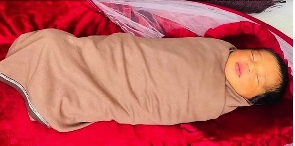Amidst the ongoing conflict in Sudan's capital, Khartoum, the majority of hospitals have shuttered their doors, leaving only a handful operational. With frequent power outages compounding the challenges, the experience of giving birth has become even more daunting for both expectant mothers and healthcare workers, particularly in cases requiring surgery.
Dr. Howaida Ahmed al-Hassan, an obstetrician, shared a video with the BBC where she revealed the reliance on mobile phone lights during a Caesarean section procedure. In the footage, she can be seen applying pressure to the patient's chest and stomach, surrounded by fellow female medics who hold up their phones to illuminate the surgical area.
Dr. Hassan, one of the few remaining obstetricians at Alban Jadeed Hospital in northern Khartoum, stayed on duty for three consecutive weeks amidst heavy fighting between military factions in April. In the video, she showcased the challenging conditions in the wards, where nurses assist mothers in labor under extremely difficult circumstances.
"The situation is really dire. We have been staying in the hospital for days on end, losing track of time. Day and night have become indistinguishable," expressed Dr. Hassan. "Staffing levels are critically low, and frequently, the electricity fails, leaving us without gasoline to power the generators for Caesarean sections."
The maternity ward at her hospital is filled with women in urgent need of emergency obstetric care, many requiring Caesarean deliveries. Dr. Hassan and her team have been taking substantial risks, performing these surgeries in dimly lit operating theatres, with limited resources at their disposal.
"We are working without the presence of anaesthesia consultants and specialists. In many cases, we have had to discharge women just 10 hours after their Caesarean deliveries," she added.
In April, the UN Population Fund estimated that around 219,000 pregnant women were at risk due to the intense fighting in Khartoum, with approximately 24,000 expected to give birth in the following weeks. Fragile ceasefires were frequently interrupted by heavy clashes, further exacerbating the already challenging situation for expectant mothers and healthcare providers.
YNA
Africa News of Sunday, 4 June 2023
Source: www.ghanaweb.com
Delivering babies in the midst of Sudan's conflict: A tale of caesarean births illuminated by phone light
Opinions












